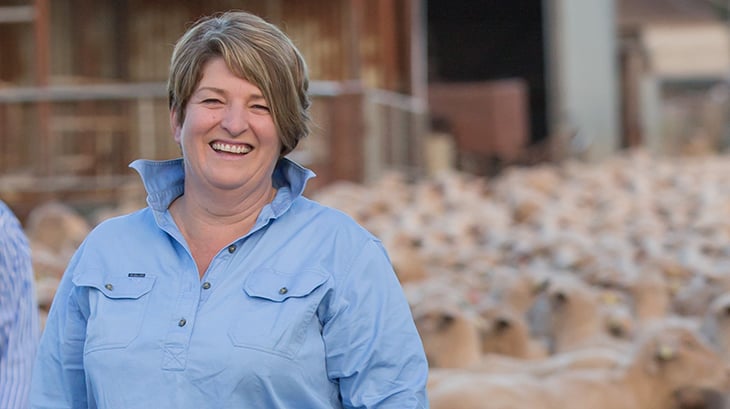Bleat Box: Meet Jane Kellock

Sheep Sustainability Framework Steering Group member, Jane Kellock, believes succession planning a key element of sustainability.
Sheep Sustainability Framework (SSF) Steering Group member Jane Kellock sees succession planning as critical to the sheep and wool industry’s environmental stewardship and financial sustainability.
Jane and Greg Kellock’s children have always been involved in decision making on their South Australian farm at Farrell Flat, near Clare, so there are no surprises when it comes to goals for the business and their vision for the future.
“All four of our children bring different aspects into our business from the industries that they work in,” she said.
“We farm in partnership with our son Sam and his wife Emma, and another son, Matthew, is an electrician and lives on the property and works with us at times.
“We couldn’t implement the environmental and animal welfare aspects of the farm without the agreement of the team. It just doesn’t work without them supporting the decisions and being a part of the decision making.”
Jane and Greg are no strangers to succession planning, having been in business with Greg’s family early in their marriage when the Kellocks ran a sheep stud and commercial flock at Farrell Flat, Keith, and east of Burra. The pair consolidated their interests and now run their own commercial Merino flock of 3,500 sheep together with mixed cropping on 1,056ha at Farrell Flat.
It wasn’t until their four children started school that Jane became involved in industry organisations.
She has been Chair of the South Australian Sheep and Beef Blueprints and has held advisory and review roles with the Southern Australia Livestock Research Council, Meat & Livestock Australia and the SA Sheep Advisory Group.
“It started when Greg and I were asked if we’d be sheep producer advocates for the Making More From Sheep program,” she said.
“Then I was asked to join the SA Sheep Industry Fund, where producers pay a levy on every sheep sold and the money is invested in programs that benefit South Australian sheep producers.
“From there I’ve just taken on other roles. I went on to the organising committee for LambEx SA, a global showcase of Australian sheep, lamb and wool production, and a few of us decided that that worked well and that we should develop a strategy for the sheep industry in South Australia, which became the Sheep Industry Blueprint.
“I’ve chaired it for the past six years and it became the Sheep and Cattle Blueprints, and then I chaired the Southern Australia Livestock Research Council. I’ve also done a company director’s course and been an elected member and Deputy Mayor of our local Goyder Council.”
Known as a straight shooter who is more interested in getting things done than having lengthy debates around industry issues, Jane works on the adage that she doesn’t expect producers to do something she wouldn’t do herself.
Twenty years ago, the Kellocks made the decision not to mules, based on concerns about animal welfare as well as the reaction from wool consumers. At the time it was a radical move.
“We didn’t like doing it and we always saw the lambs taking a hit production-wise after mulesing. And we felt that consumers had an expectation that we wouldn’t do that,” Ms Kellock said.
“We shear every six months as well, so it was a management decision we felt we could handle.
“We also have a contract with New Zealand Merino and all our wool goes into Icebreaker clothing. It’s great and we’re getting a premium price because we’ve got accreditation and can tell our story. You’ve just got to find another way of looking at things.”
Ms Kellock acknowledges that for most producers, it’s a fine line between meeting sustainability requirements and remaining financially viable.
“That is my thing, to ensure that the SSF isn’t pushing something that won’t be financially viable because it’s too hard for producers,” she said.
“But the fact is, if the majority of things in the Framework are being done right, we’re way more profitable than if we’re not doing them.
“If you do a carbon account, for example, you know where you’re at, what your goals are, and what things you need to change to make things better for everybody. It’s critical that producers do their carbon accounting so that consumers can see where we stand in the world of climate change.”
There is plenty of work still to be done by the SSF, particularly in data collection, she said.
“An enormous amount of work was done at the start to set things up, but it’s a moving framework and we need to be quite nimble. If we look back at this in five to 10 years’ time, it won’t be the same.
“Ensuring that we’re capturing the data we need is critical, and I’d like to see more work done on education, so our producers have all the knowledge to make best practice decisions.
“Are we telling our story well enough? Are we doing things the best way, or can we get a better outcome with a different method?”
More information
Contact:
Resources: